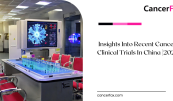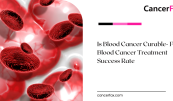Clinical Trials Of CAR T-Cell Therapy In China Has Shown Remarkable Success
CAR T-Cell therapy trials in China
2024 has been a game-changer for CAR T-Cell therapy in China! Witness remarkable success stories from clinical trials, explore advancements, and learn about the remaining challenges. Come discover the future of this ground-breaking cancer treatment that is giving millions of people hope again!
Science has made remarkable growth in the field of medicine. In the last few years, we have seen many innovative therapies and drugs that act as a boon for patients suffering from serious illnesses like cancer. Cancer remains a significant global health threat, impacting millions of lives each year.
The American Cancer Society (ACS) estimated 1,958,310 new cancer cases in 2023, excluding non-melanoma skin cancer. Sadly, more than 609,820 cancer deaths were counted for the same year.
CAR-T cell therapy is an advanced immunotherapy that trains your immune system to identify and destroy cancer cells with pinpoint accuracy.
This is not science fiction; it is the ultimate reality of CAR T cell treatment, a revolutionary immune-based approach that is generating enormous excitement in the fight against cancer.
While still in its early stages, CAR T cell therapy has shown remarkable promise in treating specific blood cancers, with ongoing research looking into its potential to cure various tumor types.
In this article, we’ll explore ground-breaking CAR T Cell therapy clinical trials in China, major areas of focus, and discuss the challenges and exciting opportunities shaping the future of this revolutionary therapy.
Read This : The Key To CAR-T Success Lies In Patient Selection – Are You The Ideal One?
Milestones In The History Of CAR T Cell Therapy In China
The journey of CAR T Cell Therapy In China resembles a race from the starting blocks, with extraordinary progress and ambition.
Pioneering Achievement (2013): China reported the first CAR T-cell therapy for B-ALL targeting CD19 in 2013, marking the initial breakthrough in the country’s adoption of CAR T-cell technology.
Rapid Evolution (2017-2019): By the end of 2017, China emerged as the country with the highest number of CAR-T cell clinical trials, showcasing rapid evolution and significant investment in this therapeutic method.
Continuous Progress (2022): Over the past few years, CAR T cell therapy for cancer in China has shown exceptional effectiveness in treating haematological cancers, showcasing continuous advancement.
Must Read: The Role Of Immunotherapy In Lymphoma Treatment
Free CAR T Cell Therapy Clinical Trials In China: Hope For All
In a groundbreaking initiative, China is currently offering free cancer treatment in China, providing new hope for patients battling certain types of cancers. Renowned hospitals such as Peking University Cancer Hospital, Sun Yat-sen University Cancer Center, West China Hospital, First Affiliated Hospital of Zhengzhou University, Beijing Gorboad Boren Hospital, and many more are actively participating in these trials.
The clinical studies are aimed at treating multiple myeloma, B-cell acute lymphoblastic leukaemia (ALL), and B-cell diffuse large B-cell lymphoma (DLBCL). Patients with these specific cancer types can now explore advanced CAR T cell therapy without the financial burden. This initiative not only broadens access to new therapies but also positions China as a global leader in cancer research and treatment.
Latest Research Results On CAR T Cell Therapy Clinical Trials In China
Research on CAR T cell therapy is advancing rapidly in China, where multiple clinical trials are exploring the treatment’s potential for different types of cancer. One exciting area is dual-targeting CAR T cells, combining attacks on multiple cancer antigens for potentially increased efficacy.
Early trials with CD19/20 targeting lymphoma demonstrated outstanding response rates, paving the path for further exploration.
Phase-2 research of anti-CD19 and anti-CD22 CAR T cells against B-cell acute lymphoblastic leukaemia (ALL) found an excellent 88% overall response rate in bone marrow and 85% in the central nervous system.
Beyond the typical CD19 target, researchers are exploring unexplored areas. Trials including BCMA, CD20, and GPC3 are producing promising outcomes in various types of cancers, showcasing the adaptability of this treatment approach.
However, safety is still a big concern. Cytokine release syndrome (CRS) can be a major difficulty, pushing researchers to propose solutions such as optimized CAR design and combination therapy to improve management.
While China leads in terms of ongoing trials, only two CAR T treatments have been approved: axicabtagene ciloleucel and relmacabtagene autoleucel, indicating accessibility challenges due to regulatory and economic constraints.
China is leading the way in CAR T-cell therapy innovation, addressing safety concerns, and investigating novel targets and dual-targeting. Although there are still obstacles in the way of wider patient access, the future of this game-changing treatment is bright.
Gain Insight: A Deep Dive Into CAR T Cell Therapy: How Does It Work?
Key Areas Of Progress In Chimeric Antigen Receptor T-Cell Therapy In China
Targeting Solid Tumors
Challenge: Traditionally, CAR T therapies have shown greater success in blood cancers than solid tumors due to complex tumor microenvironments and antigen heterogeneity.
Progress: Several Chinese trials are looking at new ways to target solid tumors.
Trials evaluating CAR T cells that express two different receptors and target several tumor antigens for increased efficacy (e.g., BCMA/CD19 for multiple myeloma, GD2/NGFR for neuroblastoma).
Studies are looking into personalized TIL-based CAR T cells tailored to each patient’s tumor, with encouraging early results in lung cancer and melanoma.
Combining CAR T cells with additional treatments such as checkpoint inhibitors or radiation has the potential to improve response and overcome resistance in solid tumors.
For example: A Phase I trial (NCT05424241) using a dual CAR T cell targeting BCMA and CD19 in relapsed/refractory multiple myeloma found encouraging safety and effectiveness findings, including full responses in certain patients.
Overcoming Toxicity Challenges
Challenge: Cytokine release syndrome (CRS) and neurotoxicity are severe side effects of CAR T therapy that raise safety concerns.
Progress: Chinese researchers are finding techniques to treat and reduce these toxicities:
Trials are being conducted on CAR T cells with changes such as “suicide genes” to allow for easy removal if significant side effects arise.
Drugs targeting specific pathways involved in CRS or neurotoxicity are being tested in combination with CAR T therapy to reduce severe reactions.
To reduce toxicity risks, CAR T cell doses and treatment plans are being tailored to specific patient’s characteristics.
For example, a Phase I/II trial (NCT04552054) using a BCMA-targeted CAR T cell with a “suicide gene” in multiple myeloma patients showed promising safety and controllable CRS, as well as encouraging effectiveness results.
Achieving Durable Responses
Challenge: CAR T cell therapy continues to face challenges in maintaining long-term tumor control and preventing relapse.
Progress: Efforts are ongoing to improve the persistence and lifetime of CAR T cells:
Trials are being conducted on CAR T cells modified to establish memory function, which could lead to longer-lasting anti-tumor actions.
Methods for stimulating CAR T cell expansion within the patient’s body following infusion are being investigated to improve their persistence and efficiency.
Researchers are looking into combining CAR T cells with other immune-stimulating drugs to provide a more long-lasting anti-tumor response.
For example, a Phase I/II trial (NCT04418739) evaluating a CD19-targeted CAR T cell with memory capabilities in B-cell leukemia revealed persistent complete responses in a large number of patients after 12 months, indicating better long-term efficacy.
CARsgen’s Advancing Cancer Care By Targeting Protein In Various Solid Tumours
CARsgen Therapeutics Holdings Limited recently revealed major developments in their revolutionary CAR T-cell therapy, CT041, at the 2024 American Society of Clinical Oncology Gastrointestinal Cancers Symposium.
The company revealed good results from the Phase 1b ELIMYN18.2 research, which focused on satricabtagene autoleucel (satri-cel), an autologous CAR-T product candidate targeted to attack Claudin18.2, a protein detected in some solid tumors.
CARsgen emphasized the safety and efficacy of satri-cel, indicating a promising profile. The Recommended Phase 2 Dose (RP2D) was determined and it is currently in Phase 1b/2 clinical trials to treat advanced gastric/gastroesophageal junction (GC/GEJ) and pancreatic cancer.
This clinical study focused on the positive safety profile, lack of serious side effects, and encouraging effectiveness, with substantial results in patients with GC/GEJ and PC.
Satri-cel’s potential as a groundbreaking treatment for these challenging cancers is becoming increasingly evident, marking a significant step forward in the field of CAR T-cell treatments.
The Future of CAR T Cell Therapy Clinical Trials In China
The future of CAR T cell therapy in China seems bright, driven by a surge in trials and a commitment to innovation. While there are presently over 100 clinical studies targeting lymphoma alone, researchers are expanding beyond blood cancers, with 2024 trials treating solid tumors using varied methodologies like dual CAR designs and personalized TIL therapy.
Chinese researchers are pioneering gene-modified “suicide genes” and targeted pharmacological interventions, with early findings indicating good safety profiles. Cost remains a barrier, but locally generated CAR T cells and new production methods provide hope for greater accessibility.
Collaboration with other nations, and the Chinese government is driving this advancement, with China planning to contribute 10% of all new CAR T medicines globally by 2030.
This holistic approach, along with rapid progress, portrays a bright future for cancer patients not only in China but around the world.
Dr. Nishant Mittal is a highly accomplished researcher with over 13 years of experience in the fields of cardiovascular biology and cancer research. His career is marked by significant contributions to stem cell biology, developmental biology, and innovative research techniques.
Research Highlights
Dr. Mittal's research has focused on several key areas:
1) Cardiovascular Development and Regeneration: He studied coronary vessel development and regeneration using zebrafish models1.
2) Cancer Biology: At Dartmouth College, he developed zebrafish models for studying tumor heterogeneity and clonal evolution in pancreatic cancer.
3) Developmental Biology: His doctoral work at Keio University involved identifying and characterizing medaka fish mutants with cardiovascular defects.
4) Stem Cell Research: He investigated the effects of folic acid on mouse embryonic stem cells and worked on cryopreservation techniques for hematopoietic stem cells.
Publications and Presentations
Dr. Mittal has authored several peer-reviewed publications in reputable journals such as Scientific Reports, Cardiovascular Research, and Disease Models & Mechanisms1. He has also presented his research at numerous international conferences, including the Stanford-Weill Cornell Cardiovascular Research Symposium and the Weinstein Cardiovascular Development Conference.
In summary, Dr. Nishant Mittal is a dedicated and accomplished researcher with a strong track record in cardiovascular and cancer biology, demonstrating expertise in various model systems and a commitment to advancing scientific knowledge through innovative research approaches.
- Comments Closed
- February 9th, 2024






BCMA CAR-T therapy, CAR T-cell clinical trials, CAR-T cell therapy China, China cancer breakthrough treatments, immunotherapy trials China, leukemia CAR-T trials, Lymphoma immunotherapy, relapsed cancer treatment
CancerFax is the most trusted online platform dedicated to connecting individuals facing advanced-stage cancer with groundbreaking cell therapies.
Send your medical reports and get a free analysis.
🌟 Join us in the fight against cancer! 🌟
Привет,
CancerFax — это самая надежная онлайн-платформа, призванная предоставить людям, столкнувшимся с раком на поздних стадиях, доступ к революционным клеточным методам лечения.
Отправьте свои медицинские заключения и получите бесплатный анализ.
🌟 Присоединяйтесь к нам в борьбе с раком! 🌟